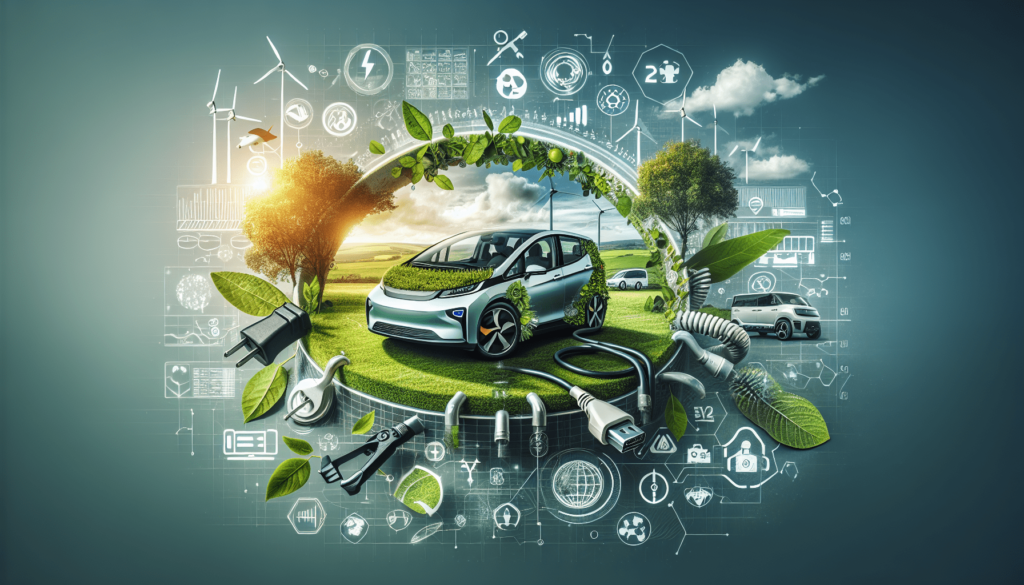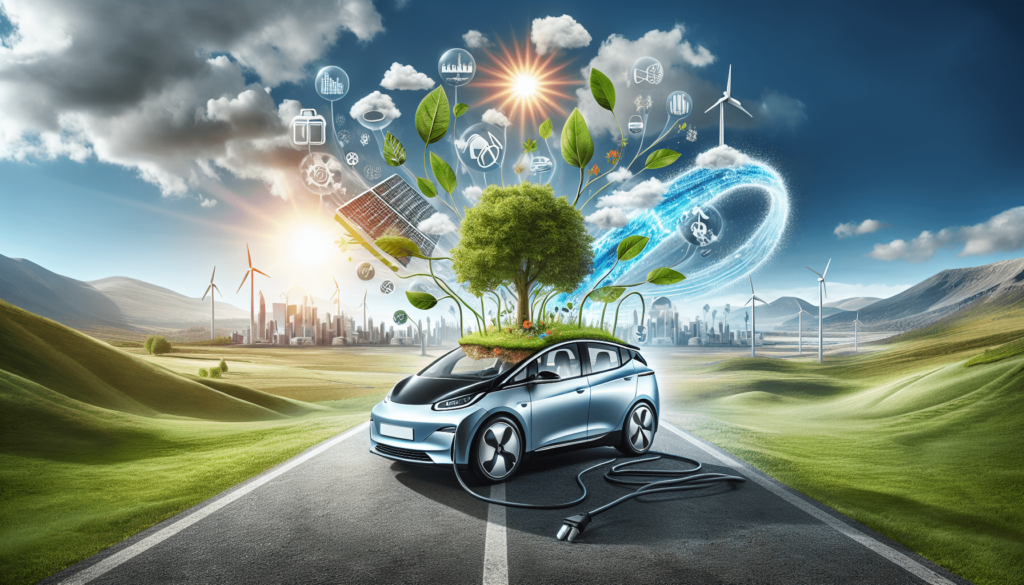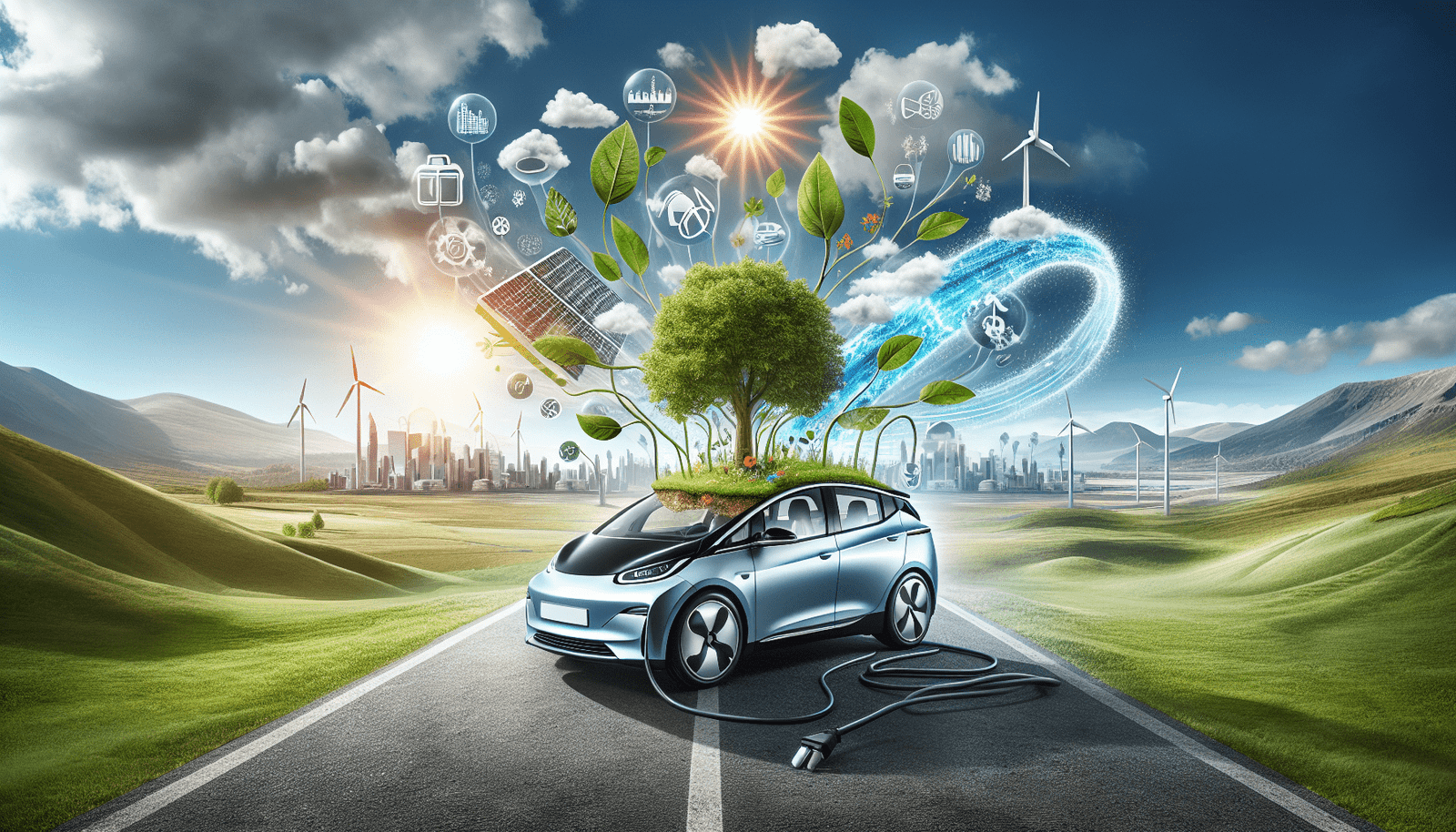In this article, we will explore the crucial question of how electric vehicle maintenance and repairs influence sustainability. As the popularity of electric vehicles continues to grow, it becomes increasingly important to understand the environmental impact of keeping these vehicles on the road. The maintenance and repairs required for electric vehicles may differ in various ways from traditional combustion engine cars, presenting both challenges and opportunities for sustainable practices. By examining the intricate relationship between electric vehicle upkeep and sustainability, we can gain valuable insights into the future of eco-friendly transportation.

Reduced Environmental Impact during Maintenance
Reduced pollution emissions
When it comes to electric vehicle (EV) maintenance, one of the key benefits is the reduced pollution emissions compared to conventional vehicles. EVs produce zero tailpipe emissions, which means they do not emit pollutants such as carbon dioxide (CO2), nitrogen oxides (NOx), and particulate matter into the atmosphere. This is crucial in tackling air pollution and reducing the overall carbon footprint.
Reduced water usage
Another advantage of electric vehicle maintenance is the reduced water usage. Unlike internal combustion engine vehicles, EVs do not require regular oil changes. Oil changes involve the use of water-intensive processes for oil extraction, refining, and disposal. With fewer fluids needing replacement and maintenance, EVs help conserve valuable water resources.
Reduced noise pollution
Maintenance activities involving conventional vehicles often contribute to noise pollution, especially in busy garages and repair shops. Electric vehicles, on the other hand, have quieter motors and produce significantly less noise during maintenance. This reduces noise pollution, making maintenance operations less disruptive to the surrounding environment and contributing to a more peaceful and pleasant atmosphere.
Reduced Environmental Impact during Repairs
Minimized hazardous waste generation
Electric vehicle repairs have the advantage of minimizing hazardous waste generation compared to traditional vehicles. EVs do not require the use of hazardous materials, such as gasoline and engine fluids containing harmful toxins. This reduces the risk of spills and releases of hazardous substances, protecting both the environment and the health of technicians working on repairs.
Reduced greenhouse gas emissions
Greenhouse gas emissions have a significant impact on climate change and global warming. Electric vehicle repairs help reduce greenhouse gas emissions as they do not involve activities like exhaust pipe repairs or emissions testing. By decreasing the need for repairs related to emissions, EVs contribute to a cleaner and more sustainable future.
Lower energy consumption
Electric vehicle repairs also contribute to lower energy consumption. Compared to conventional vehicles, EVs have simplified and more efficient systems, which leads to fewer repairs and less energy consumed during the repair process. By reducing energy consumption in repairs, EVs help conserve resources and promote a more sustainable approach to vehicle maintenance.
Extended Vehicle Lifespan
Increased durability and reliability
Proper maintenance performed on electric vehicles increases their durability and reliability, leading to an extended vehicle lifespan. Regular inspections and servicing help identify and address potential issues before they turn into major problems. By taking care of their EVs, owners can ensure a longer lifespan for their vehicles, reducing the need for premature replacements and the associated environmental impact.
Prolonged battery life
The battery is a crucial component of an electric vehicle, and its longevity is vital for maintaining the sustainability of the vehicle. Proper maintenance practices, such as avoiding deep discharges, keeping the battery at a moderate temperature, and following manufacturer guidelines, can help extend the battery life of an EV. By prolonging the battery life, the need for battery replacements decreases, thus reducing waste and conserving resources.
Reduced need for new vehicle production
Extending the lifespan of electric vehicles through proper maintenance decreases the need for new vehicle production. Manufacturing new vehicles requires significant amounts of energy and raw materials, contributing to pollution and resource depletion. By keeping their EVs in good condition, owners can reduce the demand for new vehicles, minimizing the environmental impact associated with their production.
Decreased Consumption of Resources
Reduced need for fossil fuels
One of the most significant advantages of electric vehicle maintenance is the decreased consumption of fossil fuels. Electric vehicles run on electricity, which can be generated from renewable sources such as solar and wind power. By embracing electric vehicle maintenance, individuals can reduce their dependence on fossil fuels, contributing to a more sustainable and greener transportation system.
Minimized reliance on raw materials
Electric vehicles require fewer raw materials for maintenance compared to conventional vehicles. By eliminating the need for regular oil changes, EVs decrease the demand for petroleum-based products. Additionally, many EV components are built to be more durable, reducing the frequency of replacements and the consumption of raw materials. Minimizing reliance on raw materials helps conserve natural resources and reduces the environmental impact of vehicle maintenance.
Less energy-intensive components
Electric vehicles typically have simpler and less energy-intensive components compared to their internal combustion engine counterparts. As a result, repairs and replacements of EV components require less energy consumption during the maintenance process. By using energy-efficient materials and components, EVs contribute to the overall reduction of energy-intensive processes, promoting sustainability in vehicle maintenance.

Enhanced Efficiency and Performance
Optimized energy usage
Electric vehicle maintenance focuses on optimizing energy usage, leading to enhanced efficiency and performance. Regular maintenance routines, such as checking tire pressure and ensuring proper wheel alignment, can improve energy efficiency by reducing rolling resistance and drag. By maximizing energy usage, EVs can achieve better mileage and overall performance, reducing energy waste and contributing to a more sustainable transportation system.
Improved range and battery life
Proper maintenance practices and inspections help improve an electric vehicle’s range and battery life. Regularly monitoring the battery’s health, performing software updates, and following manufacturer recommendations contribute to increased efficiency and extended driving range. By improving range and battery life, EV owners can rely on their vehicles for longer distances, reducing the need for additional charging or battery replacements.
Increased regenerative braking efficiency
Regenerative braking is a feature unique to electric vehicles that helps extend their range and increase energy efficiency. Regular maintenance ensures that regenerative braking systems are functioning optimally, capturing and converting more kinetic energy into electricity. By improving regenerative braking efficiency, EVs can recapture more energy during deceleration and braking, reducing the overall energy consumption of the vehicle.
Use of Sustainable Practices
Green repair facilities
In the realm of electric vehicle maintenance and repairs, the use of green repair facilities is gaining traction. Green repair facilities focus on sustainability by implementing environmentally friendly practices, such as energy-efficient equipment, renewable energy sources, and proper waste management. By choosing green repair facilities, EV owners can ensure that their maintenance and repair activities align with sustainable principles, minimizing their environmental impact.
Utilization of eco-friendly materials
Promoting eco-friendly materials is another crucial aspect of sustainable electric vehicle maintenance. Utilizing materials that are recyclable, low in toxicity, and have a lower impact on the environment is becoming more prevalent. From lubricants to sealants, using eco-friendly materials reduces environmental harm during repairs and maintenance. By embracing eco-friendly materials, technicians contribute to a more sustainable future for electric vehicle maintenance.
Promotion of circular economy
The concept of the circular economy is gaining momentum in the automotive industry, including electric vehicle maintenance. The circular economy focuses on reducing waste, maximizing resource efficiency, and promoting the reuse and recycling of materials. By adopting circular economy principles, repair shops and technicians can minimize waste generation, extend the lifespan of components, and promote sustainability in the maintenance and repair of electric vehicles.

Positive Economic Impact
Creation of green jobs
The shift towards electric vehicles and sustainable maintenance practices creates opportunities for the creation of green jobs. From specialized technicians trained in electric vehicle repairs to professionals involved in renewable energy-powered repair facilities, the transition to a sustainable transportation system stimulates job growth. By investing in electric vehicle maintenance and sustainable practices, governments and businesses can foster the development of a green workforce and contribute to economic resilience.
Growth of sustainable industries
The increasing demand for electric vehicle maintenance and repairs fosters the growth of sustainable industries. From manufacturers of EV components to providers of renewable energy solutions, the transition to sustainable maintenance practices creates a ripple effect, supporting the growth of businesses aligned with sustainability goals. This growth not only stimulates economic activity but also promotes a greener and more sustainable future for the automotive industry.
Lower fuel and maintenance costs
Electric vehicle maintenance brings economic benefits to vehicle owners through lower fuel and maintenance costs. EVs do not require gasoline, reducing fuel expenses significantly. Additionally, the simplified nature of electric vehicle components results in fewer maintenance requirements, translating to lower maintenance costs over the lifetime of the vehicle. By embracing electric vehicle maintenance, individuals can potentially save money while contributing to a more sustainable future.
Importance of Proper Maintenance
Regular servicing and inspections
Proper maintenance of electric vehicles involves regular servicing and inspections. Just like any other vehicle, EVs require periodic maintenance to ensure their optimal performance and longevity. Regular servicing and inspections help identify potential issues early on, preventing major breakdowns and reducing the need for extensive repairs. By staying on top of their vehicle’s maintenance schedule, owners can enjoy a smooth and trouble-free driving experience.
Prevention of major breakdowns
By adhering to proper maintenance practices, electric vehicle owners can prevent major breakdowns. Regular inspections can detect minor issues, such as wear and tear, loose connections, or failing components, that, if left unaddressed, could escalate into significant problems. Promptly addressing these issues through proper maintenance minimizes the risk of unexpected breakdowns, ensuring a reliable and hassle-free driving experience.
Optimized vehicle performance
Proper maintenance directly impacts the performance of electric vehicles. Routine maintenance tasks, such as checking tire pressure, battery condition, and software updates, contribute to optimized vehicle performance. Well-maintained EVs can deliver better acceleration, longer range, and overall improved driving experience. By prioritizing proper maintenance, owners can maximize the performance and efficiency of their electric vehicles.

Challenges in Electric Vehicle Maintenance and Repairs
Limited availability of specialized technicians
One of the challenges in electric vehicle maintenance and repairs is the limited availability of specialized technicians. Electric vehicles have unique components and systems that require specific knowledge and skills to diagnose and repair. As the transition to electric vehicles accelerates, the demand for these specialized technicians is rapidly increasing. It is essential to invest in training programs and educational resources to address this shortage and ensure sufficient support for electric vehicle owners.
Higher costs for repairs and replacements
In some cases, electric vehicle repairs and replacements can be more expensive compared to traditional vehicles. The advanced technology and specialized components involved in electric vehicles often require specialized tools, which can add to the overall cost of repairs. Additionally, the limited supply chain for EV components and the relative newness of the technology can result in higher prices. However, as the electric vehicle market matures and economies of scale improve, the costs of repairs and replacements are expected to decrease over time.
Complexity of electrical system diagnostics
Electric vehicles have complex electrical systems and diagnostics that require specialized expertise to identify and address issues effectively. The intricate interplay between software, battery management systems, and electric powertrain components makes troubleshooting more challenging. Technicians need adequate training and access to diagnostic software and tools to navigate the complexities of electric vehicle electrical systems. Continued investment in training and diagnostic resources is essential to ensure efficient and reliable repairs for electric vehicles.
Future Developments for Sustainable Maintenance and Repairs
Advancements in renewable energy-powered repair facilities
The future of sustainable electric vehicle maintenance holds promising advancements in the use of renewable energy to power repair facilities. Solar panels, wind turbines, and other renewable energy sources can provide clean and sustainable power to support the energy needs of repair shops. Embracing renewable energy for repairs not only reduces the carbon footprint associated with maintenance activities but also sets an example for a greener and more sustainable approach to the automotive industry.
Improved recycling and repurposing of EV components
As electric vehicles become more prevalent, there is a growing need for efficient recycling and repurposing of EV components. Recycling batteries and other components helps minimize waste and reduce the environmental impact of electric vehicle maintenance. Advancements in recycling technologies will contribute to the development of a closed-loop system, where components from retired or damaged EVs can be recycled and repurposed for future use, further enhancing the sustainability of electric vehicle maintenance and repairs.
Development of standardized repair protocols
Standardization is vital for efficient and effective electric vehicle maintenance and repairs. As the technology evolves, the development of standardized repair protocols will streamline the maintenance process. Standardization will ensure that technicians can diagnose and repair electric vehicles using consistent guidelines, decreasing repair times and improving reliability. By establishing standardized repair protocols, EV owners can expect consistent and quality service, promoting sustainability and trust in the maintenance and repair industry.
In conclusion, electric vehicle maintenance and repairs play a crucial role in sustainability efforts. By reducing pollution emissions, conserving water, minimizing hazardous waste generation, and embracing sustainable practices, electric vehicles contribute to a greener transportation system. Extended vehicle lifespan, decreased resource consumption, enhanced efficiency and performance, and positive economic impacts further highlight the sustainability benefits of proper electric vehicle maintenance. Despite challenges such as limited availability of specialized technicians and higher costs, future developments in renewable energy-powered repair facilities, improved recycling, and standardized repair protocols hold promise for a more sustainable future in electric vehicle maintenance and repairs. Embracing these advancements will not only benefit the environment but also promote a greener and more efficient transportation system for all.


